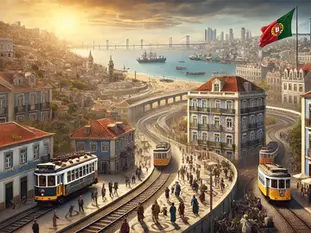Exploring the Rich Culture of Angola and Portugal

The Decolonization of Angola in 1975: Abandonment, Foreign Intervention, and Lasting Consequences
2
8
0
Introduction
The process of Angola's decolonization in 1975 represents one of the most complex and influential chapters in contemporary African history. Marked by internal conflicts, foreign intervention, and abrupt political changes, this period left a lasting legacy that continues to impact the country today. This article explores in depth the events that occurred during and after decolonization, examining the feelings of abandonment experienced by Portuguese and Angolan residents, the intervention of foreign powers such as Cuba and the Soviet Union, the controversial role of political figures like Otelo Saraiva de Carvalho, and the long-term socioeconomic consequences for Angola.
1. Historical Context of Decolonization
Portuguese presence in Angola dates back to the 15th century, with the establishment of trading posts along the coast. However, it was only in the late 19th century that Portugal established effective colonial control over the interior, spurred by the Berlin Conference of 1884–1885, which formalized the partition of Africa among European powers (Pakenham, 1991).
1.1. The Liberation Movements
In the 1950s and 1960s, nationalist movements began to emerge in Angola, influenced by the wave of independence sweeping across the African continent. The main movements were:
MPLA (Popular Movement for the Liberation of Angola): Founded in 1956, with a Marxist-Leninist ideology and support from Eastern Bloc countries.
FNLA (National Front for the Liberation of Angola): Created in 1954, with an ethnic base among the Bakongo people and support from the United States and Zaire (now the Democratic Republic of Congo).
UNITA (National Union for the Total Independence of Angola): Founded in 1966 by Jonas Savimbi, initially aligned with China and later receiving support from South Africa and the United States.
1.2. The Carnation Revolution and Its Effects
The Carnation Revolution, which occurred on April 25, 1974, was a military coup in Portugal that overthrew the authoritarian Estado Novo regime. The Armed Forces Movement (MFA), led by low-ranking officers dissatisfied with the colonial war, established a provisional government seeking rapid democratization and decolonization of the African territories (Maxwell, 1995).
2. Abandonment by the Portuguese Army
The abrupt change in Portuguese policy led to an accelerated process of decolonization. In Angola, the withdrawal of Portuguese troops was conducted in a disorganized manner, without an effective plan for the transfer of power. This power vacuum left many residents, both Portuguese and Angolan, in a vulnerable situation.
2.1. Feelings of Insecurity
Many inhabitants felt abandoned by the Portuguese authorities. The lack of security resulted in widespread violence, looting, and clashes among the different liberation movements vying for control of the territory. The collapse of the colonial administration left a void that was not promptly filled by effective governmental structures (Birmingham, 2006).
2.2. Immediate Consequences
The insecurity led to the exodus of hundreds of thousands of Portuguese and Angolans to Portugal and other countries. The mass departure of qualified professionals, known as the "return of the retornados," had a negative impact on the Angolan economy, exacerbating the challenges faced by the newly independent country (Newitt, 2007).
3. Cuban and Soviet Intervention
The Cold War significantly influenced events in Angola. The competition between the United States and the Soviet Union for ideological and strategic control of the African continent led to the intervention of foreign powers in the Angolan conflict.
3.1. Operation Carlota
In response to appeals from the MPLA, Cuba launched "Operation Carlota" in November 1975, sending approximately 36,000 soldiers to support the movement (Gleijeses, 2002). The Cuban intervention was crucial in preventing the advance of FNLA and UNITA forces, which were supported by the United States, South Africa, and Zaire.
3.2. Soviet Support
The Soviet Union provided arms, training, and logistical support to the MPLA. The collaboration between Cuba and the Soviet Union strengthened the MPLA's position, allowing it to consolidate control over Luanda and other strategic regions (Bridgland, 1986).
3.3. International Reaction
Foreign intervention turned Angola into a Cold War battleground. The United States, fearing the spread of communism, intensified support for the FNLA and UNITA. South Africa, in turn, intervened militarily in southern Angola to combat what it perceived as a regional security threat (Stockwell, 1978).
4. The Role of Otelo Saraiva de Carvalho
Otelo Saraiva de Carvalho was one of the key strategists of the Carnation Revolution and an influential figure in subsequent events related to decolonization.
4.1. Allegations of Involvement in Angola
Some sources suggest that Otelo played a role in soliciting Cuban support for the MPLA. However, this is an area of historical controversy. While Otelo expressed sympathy for African liberation movements, there is no academic consensus on his direct involvement in facilitating Cuban intervention in Angola (Maxwell, 1995).
4.2. Criticisms and Controversies
Critics argue that Otelo's actions or omissions contributed to the escalation of the conflict in Angola. They point to an alleged contradiction between his opposition to the participation of Portuguese youth in the colonial war and his support for the intervention of young Cubans in the Angolan conflict. However, it is important to note that these allegations are not universally accepted and lack conclusive evidence (Pimentel, 2011).
5. Lasting Consequences for Angola
5.1. Prolonged Civil War
The Angolan civil war lasted until 2002, becoming one of Africa's longest conflicts. It is estimated that the war caused the deaths of over 500,000 people and displaced millions (Human Rights Watch, 1999).
5.2. Socioeconomic Impact
The country's infrastructure was devastated, including roads, bridges, schools, and hospitals. Agriculture was severely affected, resulting in food shortages and dependence on international aid. The departure of qualified professionals after independence worsened the situation, creating a deficit of essential human capital for reconstruction (Hodges, 2004).
5.3. Ongoing Foreign Influence
After the war ended, Angola experienced an economic boom driven by oil and diamonds. However, the influence of foreign powers remained significant. Russia and China, which had previously supported the MPLA, became important commercial partners and investors in Angola (Campos & Vines, 2008).
Russia: Provided arms during the war and later became involved in agreements in the energy sector.
China: Heavily invested in infrastructure, construction, and natural resource exploitation in exchange for access to Angolan oil.
5.4. Current Challenges
Angola faces challenges such as corruption, social inequality, and dependence on natural resources. Although there has been progress in rebuilding infrastructure, issues of governance and transparency remain (Aguilar, 2015).
6. Reflections on Decolonization and Its Legacies
6.1. Historical Complexity
The decolonization of Angola was not a linear or uniform process. It involved a complex web of internal and external interests, ethnic and ideological conflicts, and the interference of global superpowers (Minter, 1994).
6.2. Need for Multiple Perspectives
Fully understanding this period requires considering multiple perspectives. Narratives vary among former Portuguese settlers, Angolans from different ethnic groups, historians, and international observers. Recognizing these diverse voices is essential for a balanced analysis (Chabal & Vidal, 2007).
6.3. Lessons Learned
Importance of an Ordered Transition: The absence of an effective plan for power transfer can lead to chaos and conflict.
Consequences of Foreign Intervention: Interference by external powers can exacerbate internal conflicts and prolong suffering.
Value of Dialogue and Reconciliation: Peace processes and reconciliation are crucial for post-conflict reconstruction.
Conclusion
The decolonization of Angola in 1975 was an event of profound historical importance, whose effects resonate to this day. The feelings of abandonment experienced by many residents, the intervention of foreign powers, and the actions of influential political figures contributed to shaping the country's destiny. By examining these events with historical rigor and sensitivity to diverse perspectives, we can gain valuable insights into the challenges faced by Angola and the opportunities to build a more stable and prosperous future.
References
Aguilar, R. (2015). Angola’s Fragile Oil Boom. The Oxford Institute for Energy Studies.
Birmingham, D. (2006). Empire in Africa: Angola and Its Neighbors. Ohio University Press.
Bridgland, F. (1986). The War for Africa: Twelve Months that Transformed a Continent. Ashanti Publishing.
Campos, I., & Vines, A. (2008). Angola and China: A Pragmatic Partnership. Chatham House.
Chabal, P., & Vidal, N. (Eds.). (2007). Angola: The Weight of History. Hurst & Company.
Gleijeses, P. (2002). Conflicting Missions: Havana, Washington, and Africa, 1959–1976. University of North Carolina Press.
Hodges, T. (2004). Angola: Anatomy of an Oil State. Indiana University Press.
Human Rights Watch. (1999). Angola Unravels: The Rise and Fall of the Lusaka Peace Process. Human Rights Watch.
Maxwell, K. (1995). The Making of Portuguese Democracy. Cambridge University Press.
Minter, W. (1994). Apartheid’s Contras: An Inquiry into the Roots of War in Angola and Mozambique. Zed Books.
Newitt, M. (2007). Portugal in Africa: The Last Hundred Years. C. Hurst & Co.
Pakenham, T. (1991). The Scramble for Africa. Abacus.
Pimentel, I. (2011). Revolução e Democracia: O PREC. Esfera dos Livros.
Stockwell, J. (1978). In Search of Enemies: A CIA Story. W.W. Norton & Company.







